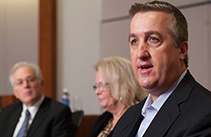Agenda
Opening session: Foundational skills | Sept. 15 – 17
Cornell University, Ithaca, NY
Monday, Sept. 15
Noon – 12:45 p.m.
Welcome lunch
12:45 – 1 p.m.
Introductions and program overview
1 – 4:30 p.m.
Leading effective organizational change
Elizabeth A. “Beta” Mannix, PhD, Ann Whitney Olin Professor of Management, SC Johnson Graduate School of Management, Cornell University
Leading through change is one of the most important challenges facing leaders and one of the most common problems for organizations. From moments of opportunity to times of adversity, high-performing leaders guide their organizations through challenges and change. Successful leaders understand how to open people’s minds to move past the obstacles that stall new ideas and innovation. They coordinate teams across diverse, cross-functional knowledge areas and engage and motivate technical experts. In this session, we will use various techniques, including industry examples and interactive simulations and exercises to explore this topic. We will identify change traps and derailers and focus on the critical competencies needed to accelerate successful change.
4:30 – 5 p.m.
Capstone orientation
5:30 – 7 p.m.
Reception and dinner
Tuesday, Sept. 16
7:30 – 8:30 a.m.
Breakfast
8:30 a.m. – noon
Strategic negotiation
Stephen Sauer, PhD, Senior Lecturer, SC Johnson Graduate School of Management, Cornell University
Healthcare professionals must understand how to manage conflict. Physicians may have difficult conversations with insurers or patients, nurses must manage their teams or clinicians from other departments and administrators may find themselves negotiating internally or externally with providers.
In this session, we will cover everything from understanding your BATNA (best alternative to a negotiated agreement) to refining your aspirations in response to the other party’s needs and tactics. We’ll use interactive, real-world negotiation simulations to help participants understand their personal tendencies in the face of conflict and learn how to manage their bargaining strengths and weaknesses. Focusing on healthcare examples, we will discuss how to manage difficult people, handle manipulative tactics, when to walk away from a negotiation and how to increase your likelihood of reaching the prized win-win solution.
Noon – 1 p.m.
Lunch
1 – 4:30 p.m.
Strategic negotiation | Part 2
4:30 p.m.
Dinner on your own in Ithaca
Wednesday, Sept. 17
7:30 – 8:30 a.m.
Breakfast
8:30 – 10:45 a.m.
Fostering a culture of motivation and engagement
Elizabeth A. “Beta” Mannix, PhD
How can we lead with clarity, focus and purpose? How can we motivate, engage and drive our teams toward results — yet also be open and empowering? Nowhere is this balance more critical than in healthcare, where we must learn to work together to achieve a positive patient experience, outstanding technical outcomes and efficient, affordable care. In this session, we will explore practical tools for fostering results-driven cultures of psychological safety, motivation and engagement.
10:45 – 11 a.m.
Break
11 a.m. – 12:30 p.m.
Making it real: Positioning for success
Steven I. Goldstein, President, System Integration Strategy, UR Medicine
Due to federal and state healthcare reform initiatives, chief executives must grapple with the challenges of today’s climate while taking steps to manage change. In New York, leaders must operate in a highly regulated and politically active environment, be conscious of issues ranging from workforce to shifting reimbursement and maintain a positive operating margin — all while ensuring their facilities deliver the best patient care. This session will include a candid assessment of the current healthcare landscape and the challenges faced. Discussions will also cover leadership questions and strategies and what management teams can do to keep healthcare provider institutions on a path to success.
12:30 p.m.
Closing comments and adjournment
Box lunches will be available.





